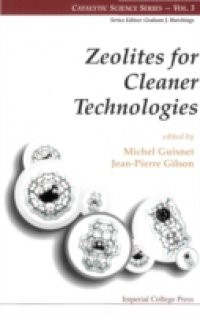This book, written and edited by leading authorities from academia and industrial groups, covers both preventive- and curative-zeolite-based technologies in the field of chemical processing.The opening chapter presents the state of the art in zeolite science. The two subsequent chapters summarize the chemistries involved in the processes and the constraints imposed on the catalyst/adsorbent. Three major areas are covered: oil refining, petrochemicals and fine chemicals. A chapter on the (curative) use of zeolites in pollution abatement completes this overview.In the area of oil refining, a general lecture sets the scene for present and future challenges. It is followed by in-depth case studies involving FCC, hydrocracking and light naphtha isomerization. Also, an entire chapter is devoted to the often-overlooked subject of base oils.In the area of petrochemicals, the processing of aromatics and olefins is described and special attention is paid to the synergy between catalysis and separation on molecular sieves.Contents:Introduction to Zeolite Science and Technology (M Guisnet & J-P Gilson)The Chemistry of Catalytic Processes (A Corma & A Martínez)Preparation of Zeolite Catalysts (T G Roberie et al.)Refining Processes: Setting the Scene (R H Jensen)Advances in Fluid Catalytic Cracking (E T Habib et al.)Hydrocracking (J A R Van Veen)C4-C6 Alkane Isomerisation (F Schmidt & E Köhler)Base Oil Production and Processing (M Daage)Para-Xylene ManufacturingCatalytic Reactions and Processes (F Alario & M Guisnet)Separation of Paraxylene by Adsorption (A Méthivier)Aromatic Alkylation: Towards Cleaner Processes (J S Beck et al.)Methanol to Olefins (MTO) and Beyond (P Barger)Zeolite Effects on Catalytic Transformations of Fine Chemicals (D E De Vos & P A Jacobs)Functionalization of Aromatics over Zeolite Catalysts (P Marion et al.)Zeolites and ‘Non-Zeolite’ Molecular Sieves in the Synthesis of Fragrances and Flavors (W F Hoelderich & M C Laufer)Pollution Abatment Using Zeolites: State of the Art and Further Needs (G Delahay & B Coq)Readership: Undergraduates, graduate students, academics and researchers in catalyst chemistry.

